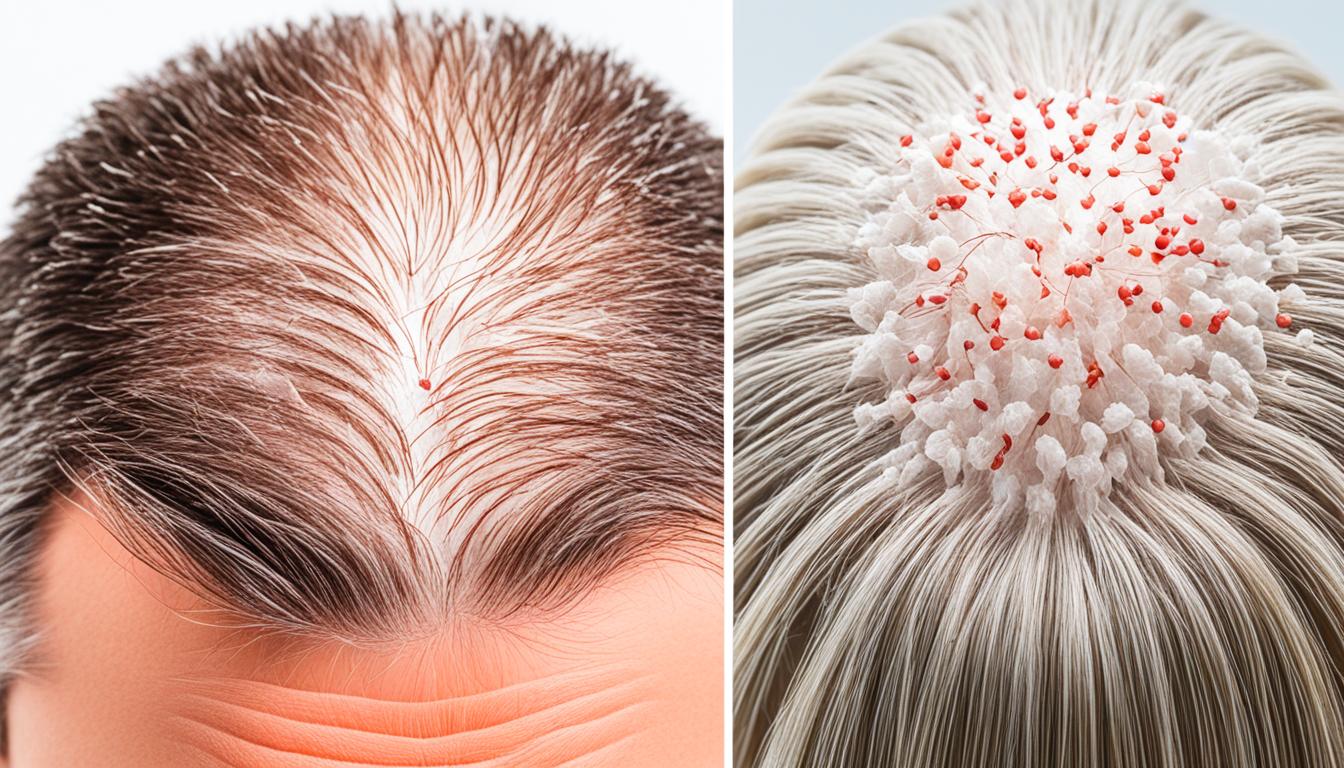If you’re experiencing hair loss, you’re not alone. It’s a common concern that can affect both men and women. At our hair loss clinic, we understand the impact it can have on your confidence and appearance. That’s why we offer effective hair regrowth solutions to help you regain a full head of hair and restore your self-esteem.
When it comes to treating hair loss, it’s important to consult with a hair restoration specialist who can provide personalized recommendations based on your specific needs. Our team of experts has the knowledge and experience to assess your condition and determine the best course of action.
One of the most effective treatment options for hair loss is hair restoration surgery. This procedure involves transplanting small units of follicles from a donor site to the area of hair loss, resulting in a natural-looking appearance. Whether you’re dealing with male pattern baldness or experiencing hair loss as a woman, hair restoration surgery can help you achieve significant hair regrowth.
In addition to surgical options, there are non-surgical treatments that can stimulate hair growth. Topical therapies, such as minoxidil, and low-level light therapy have shown promising results in combating hair loss. These treatments can be used in conjunction with other approaches to maximize their effectiveness.
When it comes to finding the best hair loss clinic near you, it’s important to choose a reputable provider with a track record of success. Look for a clinic that specializes in hair restoration and has a team of experienced professionals who are dedicated to helping you achieve optimal results.
Don’t let hair loss hold you back. With effective treatment options available near you, you can regain your confidence and achieve the hair regrowth you desire.
Key Takeaways:
- Consult with a hair restoration specialist to determine the best treatment approach for your hair loss.
- Hair restoration surgery is an effective option for both men and women with hair loss.
- Non-surgical treatments like topical therapies and low-level light therapy can stimulate hair growth.
- Choose a reputable hair loss clinic that specializes in hair restoration.
- Take action and regain your confidence with effective hair loss treatment near you.
Causes and Diagnosis of Hair Loss
Hair loss can have various causes and understanding the underlying factors is crucial for effective diagnosis and treatment. Both men and women can experience hair loss, which can be attributed to genetic factors, hormonal changes, dietary deficiencies, medical conditions, and certain life events.
Male pattern baldness: Commonly known as androgenetic alopecia, male pattern baldness is the most prevalent cause of hair loss in men. It is typically inherited from either the father or mother and is characterized by a gradual thinning of the hair on the scalp, often resulting in a receding hairline and bald spots.
Female pattern hair loss: Women can also suffer from pattern hair loss, although it may present differently than in men. Female pattern hair loss can occur due to genetic factors, hormonal changes, such as those experienced during menopause, or dietary deficiencies, including low iron levels.
Hair loss can also be triggered by factors such as pregnancy, injury, surgical scars, or medical conditions like thyroid disorders or autoimmune diseases.
Diagnosing the specific cause of hair loss involves a comprehensive evaluation by a dermatologist or hair restoration specialist. The diagnosis process may include:
- Physical examination: The healthcare professional will visually assess the scalp, hair, and overall hair density to identify any visible signs or patterns of hair loss.
- Medical history review: Gathering information about medical conditions, family history of hair loss, medication usage, and recent life events can provide valuable insights into the potential cause of hair loss.
- Additional tests: In some cases, blood tests may be conducted to analyze hormone levels, nutritional deficiencies, or autoimmune markers. A scalp biopsy might also be recommended to examine the hair follicles under a microscope for further analysis.
By conducting a thorough diagnosis, healthcare professionals can determine the underlying cause of hair loss and develop a personalized treatment plan.
Treatment options:
“Understanding the causes of hair loss is the first step towards finding effective treatment options.”
Once the cause of hair loss has been identified, various treatment options can be explored, depending on the severity and individual preferences. Some common hair loss treatment options include:
| Treatment | Description |
|---|---|
| Medications | Medications such as minoxidil and finasteride can help stimulate hair growth or slow down hair loss. Minoxidil, available over-the-counter, is a topical solution that is applied directly to the scalp. Finasteride, a prescription medication, is taken orally to inhibit the conversion of testosterone into dihydrotestosterone (DHT), a hormone known to contribute to hair loss. |
| Hair transplant | Hair transplant surgery involves the extraction of hair follicles from a donor site and their transplantation into areas of hair loss. This procedure can provide natural-looking results and is suitable for both men and women with significant hair loss. |
| Laser therapy | Low-level laser therapy (LLLT) uses red light to stimulate hair follicles, promoting hair growth. LLLT devices can be used at home or administered in clinics specializing in hair restoration. |
It’s important to consult with a hair restoration specialist or dermatologist to determine the most suitable treatment option based on individual needs and preferences. They can provide professional guidance and create a customized treatment plan to address hair loss effectively.
Hair Loss Treatment Options
When it comes to hair loss, there are several treatment options available to address different causes and individual needs. From medications to surgical procedures and innovative therapies, here are some of the most effective options:
1. Medications:
Minoxidil: A widely used over-the-counter topical treatment, minoxidil stimulates hair growth and prevents further loss. By increasing blood flow to the hair follicles, it can help revive thinning hair. It’s available in various strengths, and consistent use is key to seeing results.
Finasteride: This prescription medication works by blocking the hormone responsible for hair loss, promoting hair regrowth in men with pattern baldness. It is typically taken in tablet form and can effectively slow down hair loss and stimulate new hair growth.
2. Hair Transplant Surgery:
Hair transplant surgery is a popular and effective long-term solution for significant hair loss. During the procedure, follicular units are extracted from a donor site (typically the back of the scalp) and transplanted to the balding areas. The transplanted hair grows naturally and can provide permanent results. It is essential to consult with a qualified hair transplant surgeon to determine if you are a suitable candidate for this procedure.
3. Laser Therapy:
Low-level laser therapy (LLLT) has gained popularity as a non-invasive and safe treatment for hair loss. This therapy uses red light wavelengths to penetrate the scalp, stimulating hair follicles, increasing blood flow, and promoting hair growth. LLLT can be administered through handheld devices or laser caps, and regular use can lead to visible improvements in hair density and thickness.
4. Other Treatment Options:
In addition to medications, hair transplants, and laser therapy, there are various other treatment options available, depending on individual needs:
- Corticosteroid injections can help reduce inflammation and promote hair growth in certain conditions.
- Microneedling stimulates the scalp’s natural healing response and can aid in hair growth by increasing collagen production.
- Platelet-rich plasma (PRP) therapy involves injecting concentrated platelets derived from the patient’s own blood to stimulate hair follicles and promote growth.
The choice of treatment depends on factors such as the extent of hair loss, personal preferences, and the recommendation of a hair restoration specialist. Consulting with a qualified professional can help determine the most suitable treatment plan for your specific needs.
Conclusion
Hair loss can have a significant impact on your self-esteem and appearance. However, with the advancements in hair loss treatments, there are effective options available to help you regain confidence and achieve significant hair regrowth.
One popular treatment option is hair restoration surgery, such as hair transplant, which provides natural-looking results and is suitable for both men and women. By transplanting follicles from a donor site to the area of hair loss, this surgical procedure can restore your hair and improve your overall appearance.
Aside from hair transplant, there are also non-surgical treatments that can stimulate hair growth. Medications like minoxidil and finasteride can be effective in preventing further hair loss and promoting regrowth. Additionally, therapies such as laser therapy, microneedling, and platelet-rich plasma therapy have shown promising results in stimulating hair growth.
To prevent or reduce hair loss, it is important to maintain a healthy lifestyle, practice proper hair care, and address any underlying medical conditions. Consulting with a hair restoration specialist or dermatologist is crucial in determining the right treatment approach for your individual needs and preferences.
At our reputable hair transplant center, we offer a range of hair loss prevention and hair growth treatments. With our expertise and the latest advancements in the field, we are dedicated to helping you achieve the best possible results in your hair restoration journey.
FAQ
What causes hair loss?
Hair loss can be caused by a variety of factors, including genetic factors, hormonal changes, dietary deficiencies, and certain medical conditions.
What is male pattern baldness?
Male pattern baldness, also known as androgenetic alopecia, is the most common cause of hair loss in men and is usually inherited from either the father or mother.
Can women experience hair loss?
Yes, women can also experience hair loss due to various factors, such as genetic factors, dietary deficiencies, and hormonal changes.
How is hair loss diagnosed?
Hair loss diagnosis typically involves a physical exam, medical history review, and possibly additional tests, such as blood tests or scalp biopsies.
What are the treatment options for hair loss?
Treatment options for hair loss include medications like minoxidil and finasteride, hair transplant surgery, laser therapy, corticosteroid injections, microneedling, and platelet-rich plasma therapy.
Is hair transplant surgery effective?
Yes, hair transplant surgery is a highly effective treatment option for hair loss, providing natural-looking results.
Can hair loss be prevented?
While it may not always be possible to prevent hair loss, maintaining a healthy lifestyle, proper hair care, and addressing any underlying medical conditions can help prevent or reduce hair loss.

